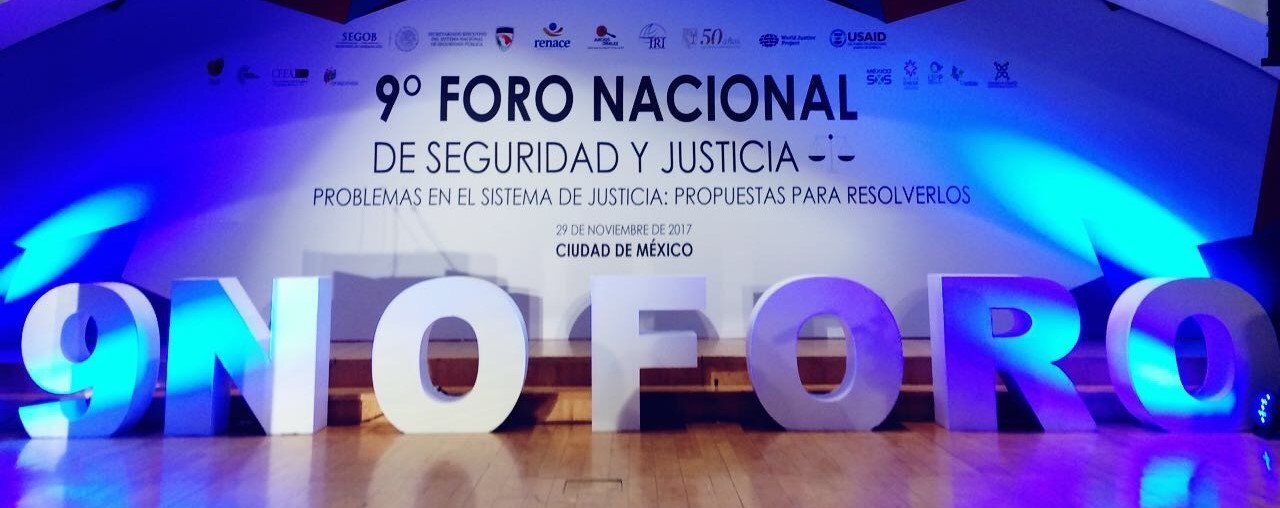
On June 18, 2016, Mexico transitioned to a new penal justice code—an accusatory system based on a presumption of innocence. The new code created an independent prosecutor’s office and alternative mechanisms for resolving conflicts. For example, now Mexicans can address local amicable disputes without long drawn out proceedings in criminal court. However, a year and a half later, these reforms have not been thoroughly implemented in all of Mexico’s 32 states, leaving much work to be done.
Partnering with Mexican civil society and government entities at national, state, and local levels, IRI is helping to build public awareness and support for the new justice system. As part of that mission, IRI sponsored the ninth annual National Security and Justice Symposium held late November in Mexico City. The forum, Problems with the Justice System & Proposals to Solve Them, gathered over 200 stakeholders from government, academe, civil society, the private sector, and international donor community to discuss challenges, opportunities and advances in the justice system. Participants included Mexico’s Ministry of the Interior (SEGOB), The National Secretariat for Public Security (SENSP), RENACE, World Justice Project, Walmart, and foreign donors like USAID.
Participants agreed one of the greatest remaining challenges was the lack of political will to establish an independent Attorney General’s office. The creation of the office, and appointment of an independent Attorney General, would be crucial to establishing the rule of law, ensuring transparency, and providing protection from political interference. Second, levels of impunity remain high in the country. According to the Global Impunity Index, Mexico ranks fourth in the world with only seven out of 100 crimes committed reported due to citizen’s lack of trust in the justice system. Third, reform implementation is complex given minimal harmonization of legal protections and difficulty in overcoming bottlenecks in the operation of new and old penal codes still existing side-by-side in some states.
However, despite obstacles, there is no turning back on Mexico’s justice reforms. Availability of new legal protections as well as an improvement in regulations and the incorporation of best practices for establishing strong legal protocols all represent important progress for the rule of law.
In the background, IRI’s Seguridad con Justicia (Security with Justice) program, funded by the U.S. Department of State’s Bureau of International Narcotics and Law Enforcement Affairs, is working to build public understanding of the new system at the local, state and national levels. In collaboration with Mexico’s premier justice reform organization, the Institute is in 15 states (Colima, Chihuahua, Hidalgo, Michoacán, Nuevo León, Baja California, Yucatán, Durango, Jalisco, San Luis Potosí, Chiapas, Puebla, Querétaro, Quintana Roo and Tlaxcala) helping to develop strategies that advance and socialize various aspects of the reforms.
Through our work, we are creating citizen and public awareness campaigns, including “justice theater” (the use of mock mediation trials before expert and public audiences), social and traditional media, and outreach efforts to inform and train local authorities from the executive branch, civil society and citizens about the alternative justice mechanisms for conflict resolution.
Working with officials and citizens to better understand justice reforms—presumption of innocence and right to trail, for example—helps institutionalize and strengthen Mexico’s justice system and the rule of law. Supporting these initiatives contributes to lowering violence, crime and corruption—all critical to U.S. security.
Enhancing the rule of law via citizen-centered initiatives and democratic governance principles helps ensure sustainability, replicability and credibility in helping to advance Mexico’s justice reforms.
Top